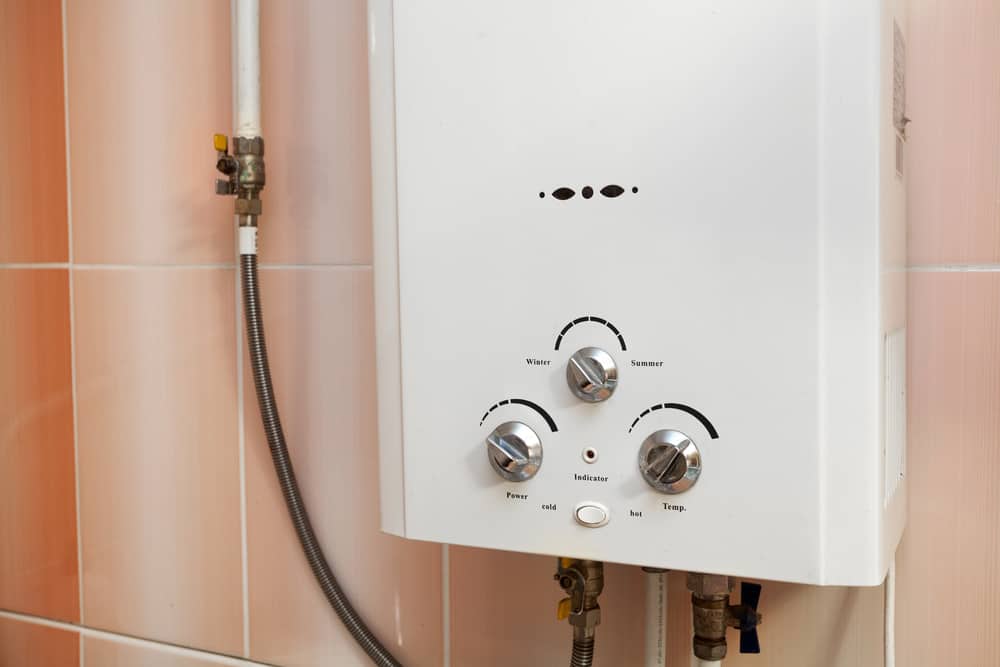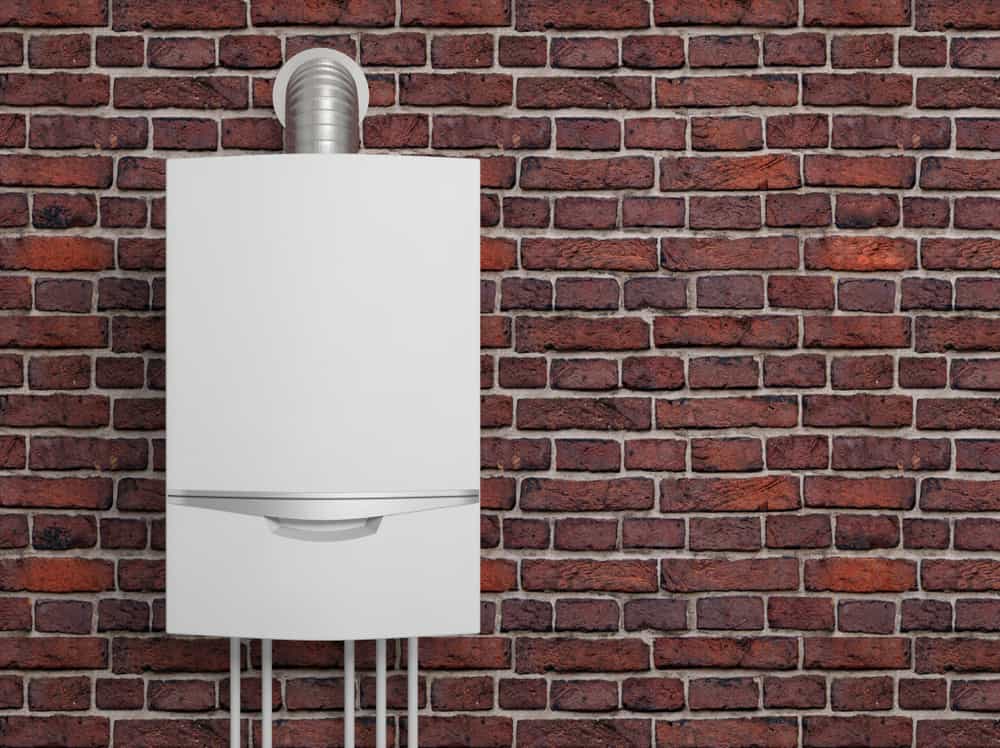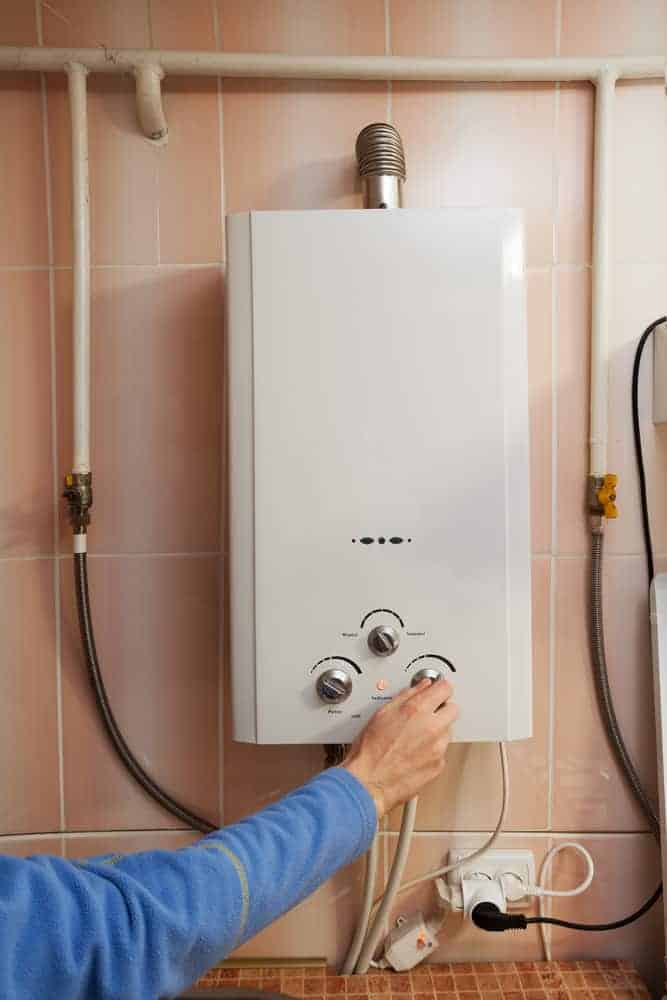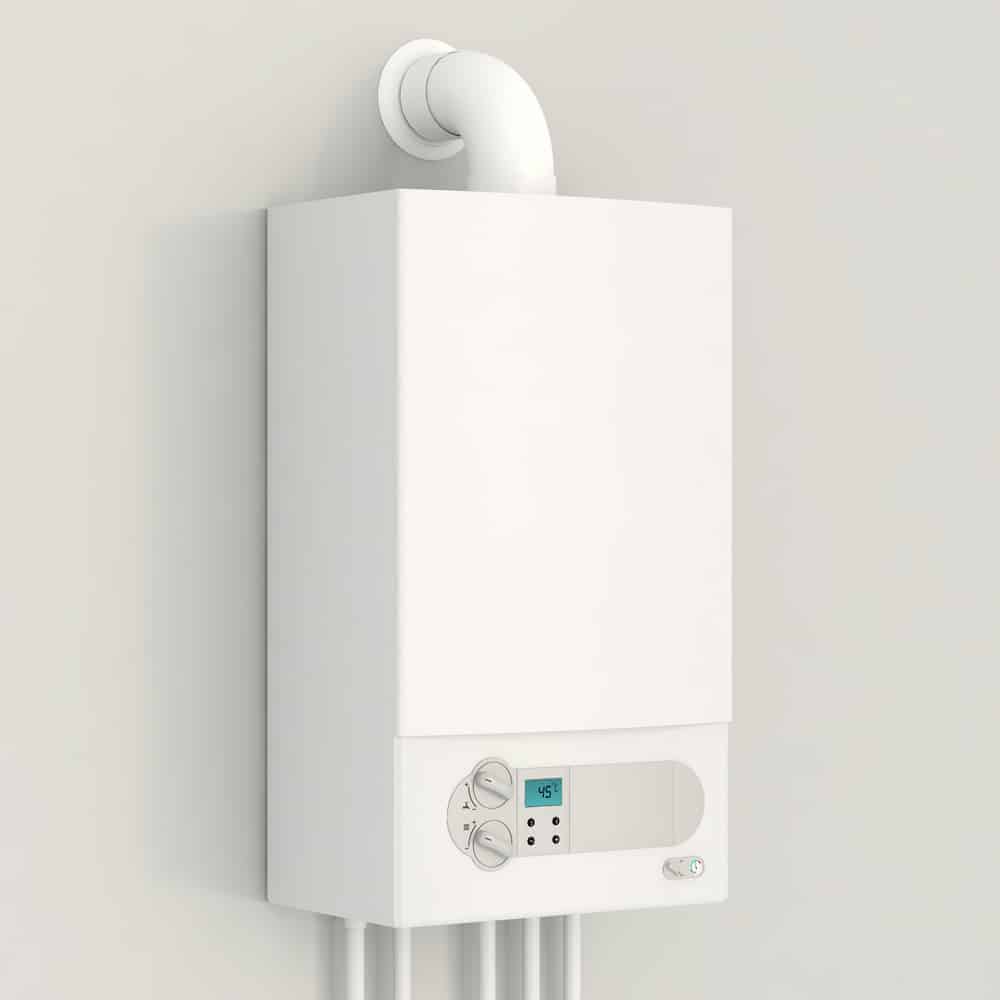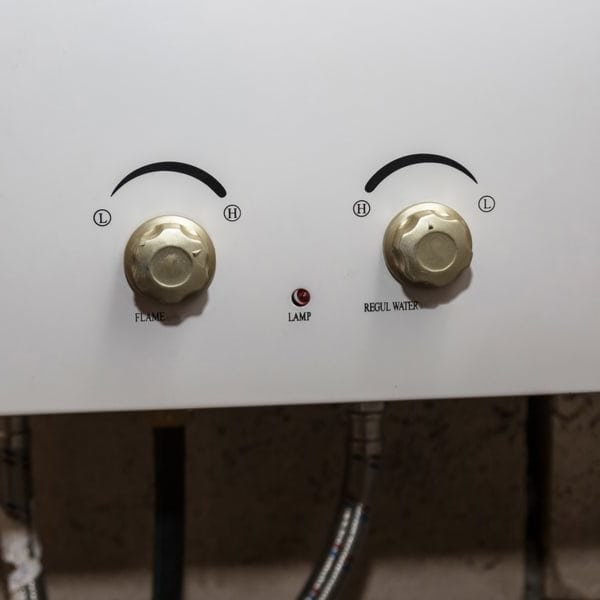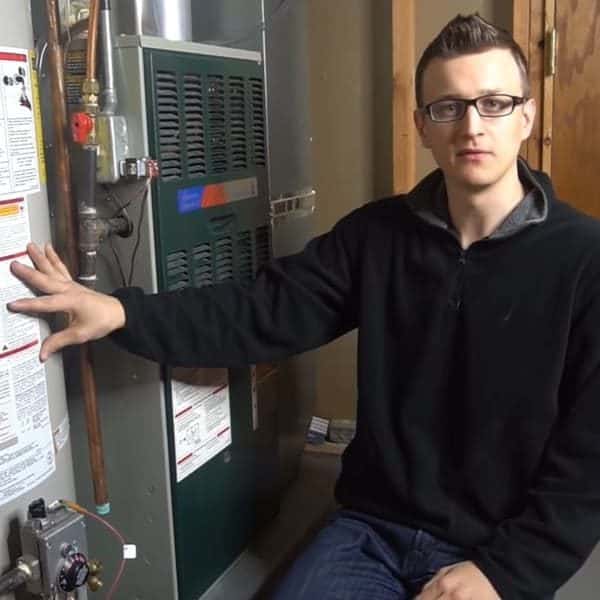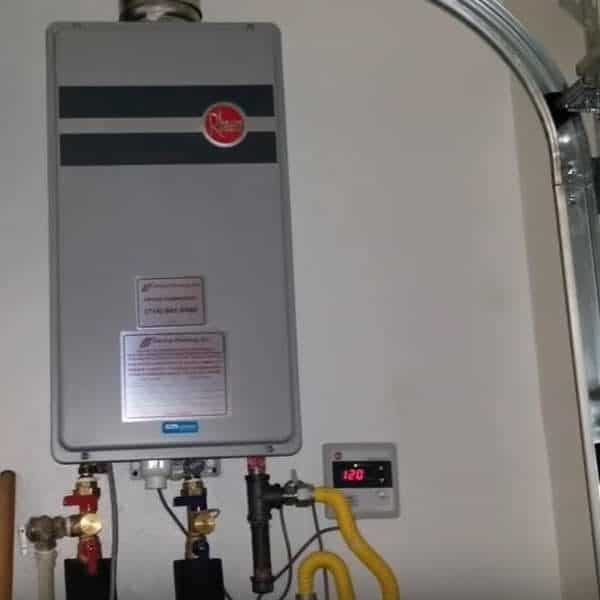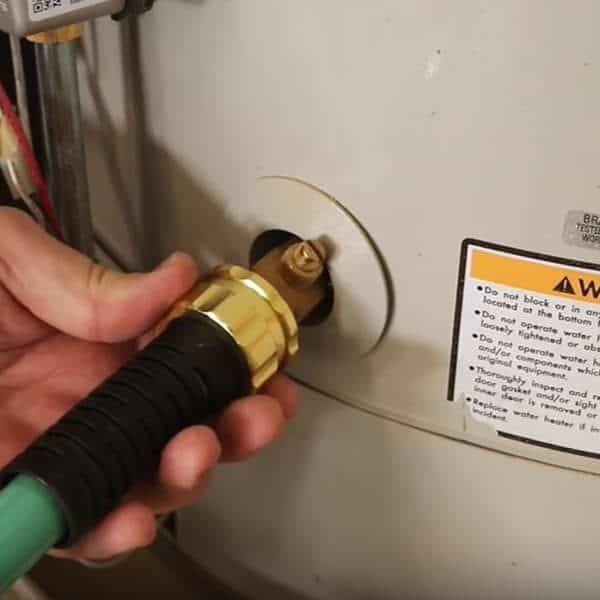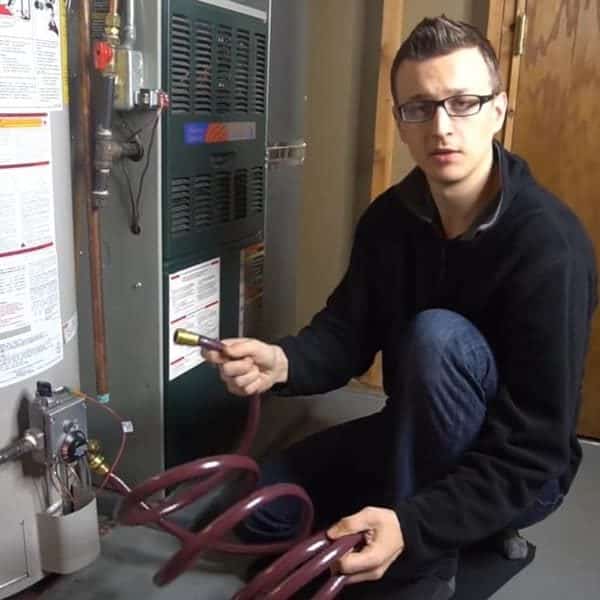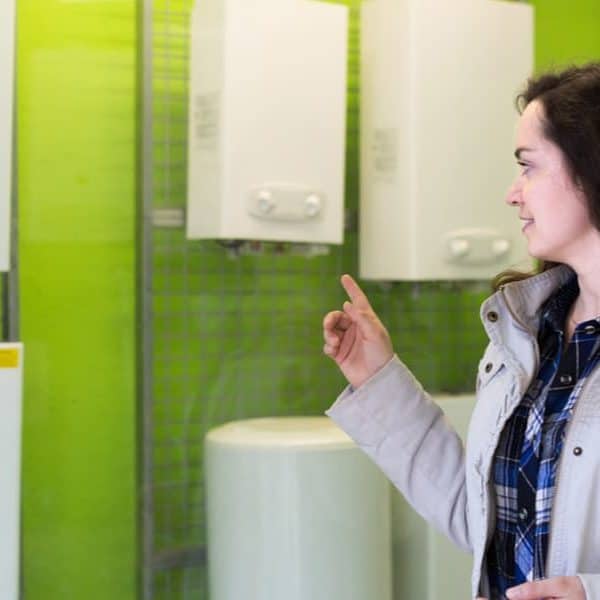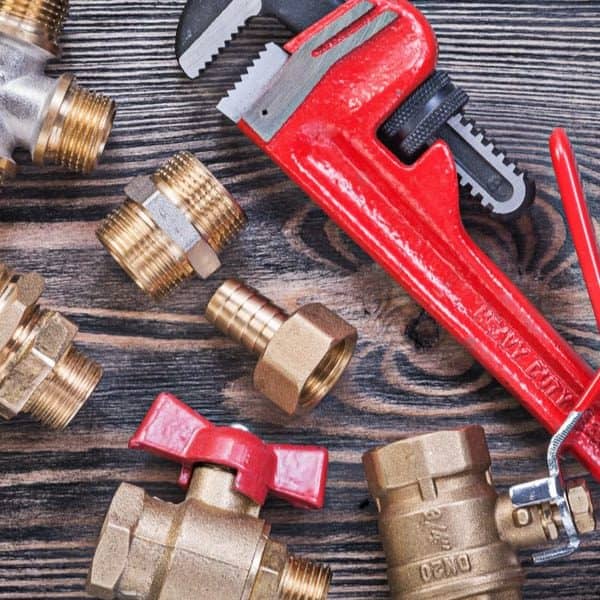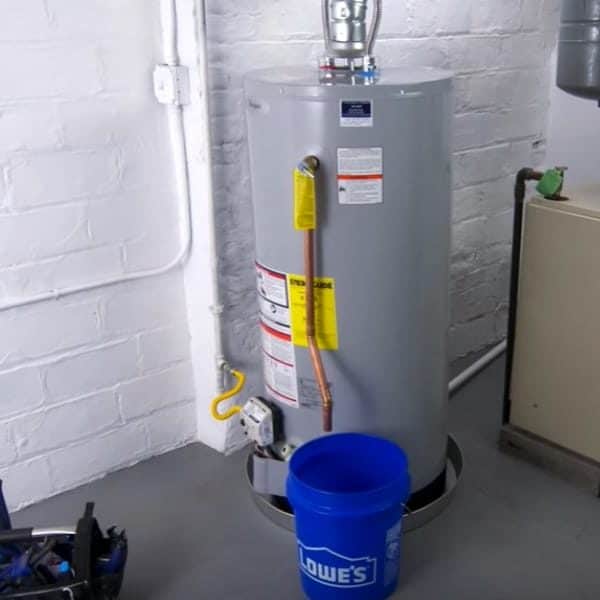If you want to enjoy hot water on demand, a tankless water heater is a great choice. And if you’re interested in fuel efficiency, propane is a great choice.
Read on for our run-down of seven of the best propane tankless water heaters available today. Then check out our buying guide for hints and tips on choosing the one that’s right for your home.
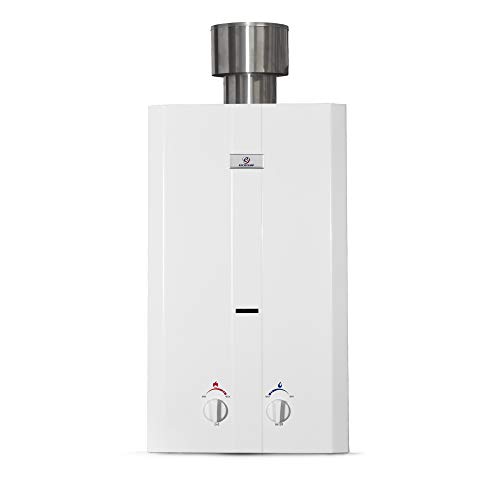
- Capable of running effectively at altitude
- Comes with its own, good quality shower head, as well as gas regulator and hose
- Impressive output for a portable unit
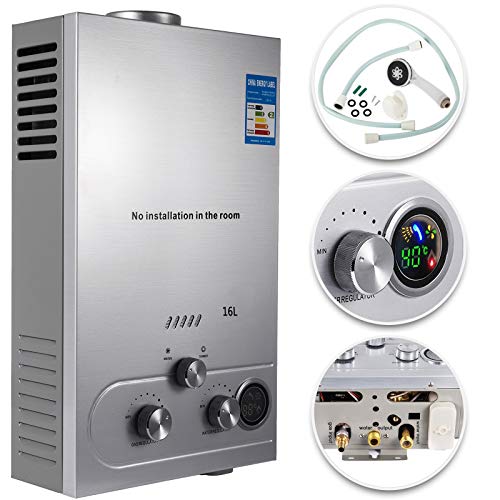
- Cost-effective unit for smaller homes and RVs
- Can handle a big range in water pressure
- Choice of winter or summer settings for improved fuel efficiency
The Best Propane Tankless Water Heater of 2023
1. Rinnai RUC98iP Ultra Series Propane Tankless Water Heater

Rinnai’s Ultra Series of water heaters have bags of power to deliver hot water wherever and whenever you need it. The RUC98iP is the propane-fueled model, and it has an output of 199,000 BTUs – that’s British thermal units.
That’s the maximum output available in a domestic water heater. Any higher than this, and you’ll need a specialist plumbing license for installation.
The measurement means it will heat 1,990 pounds of water 100 degrees in an hour. That means up to 9.8 gallons of water every 60 minutes – enough to satisfy the most demanding consumers. It runs nice and quiet too.
Bear in mind that external temperatures will affect capacity. Colder water entering the unit will require more power to heat to the desired temperature. So if you’re in an area that experiences chilly winters, be prepared to notice a difference.
If you’re able to run three showers comfortably in the summer, don’t be surprised if you have to reduce to two in winter. That’s less to do with the Rinnai’s specifications than it is about the way tankless water heaters work.
The water heats up quickly, but it’s not instantaneous. Expect to wait a few seconds, perhaps longer depending on how far away the tap is from the heater.
Aesthetically, this heater is a winner. It has a neat space-saving design, that will fit comfortably almost anywhere. And it’s finished in smart stainless steel.
You can choose from either concentric or inexpensive PVC venting. The system generates ultra-low nitrogen oxide emissions, so it’s kind to the environment.
The specifications here are impressive, and they come at a price. This is a pretty expensive appliance. And if you choose it, shop around before selecting someone to install it. The costs can be eye-watering.
The system should be flushed with vinegar water once a year to descale it. You may want to do this more often if you’re in an area with very hard water.
Fortunately, the valves you’ll need for descaling are included in the package. They’re surprisingly expensive to buy separately – about a tenth the price of the heater.
Pros:
- 199,000 BTUs output – the maximum available for a domestic water heater
- Choice of concentric or PVC venting
- Ultra-low nitrogen oxide emissions
Cons:
- You may have to wait a few seconds for hot water to reach the tap
- Expensive – and installation can be costly too.
2. Eccotemp i12-LP Propane Tankless Water Heater
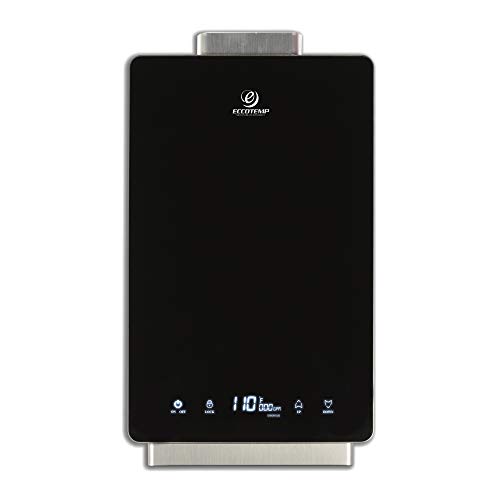
If style is one of your criteria for your water heater, check out the i12-LP from Eccotemp.
The front panel is made of sleek black tempered glass, with an LED display for flow rate and output temperature. Needless to say, it’s designed for indoors installation, and will look the business in any modern interior.
It’s designed for small and medium-demand applications. It has enough oomph to supply hot water to a couple of appliances at the same time. It will work well in smaller homes or for occasional use in holiday cottages or cabins.
There are fully automatic temperature controls. And you can make adjustments using the touch screen display. And if you share your home with small people, you’ll be reassured to know there’s a child lock.
The hot water ranges from 0.6 to 4.8 gallons per minute. The minimum gas rate is 25,000 to 80,000 BTUs.
It comes with the complete horizontal stainless steel venting kit. And the 110-volt power cord for the internal exhaust fan and digital display is included too.
This is a very energy-efficient option. With no need for a pilot light, it draws only about 2 watts while not in use. That rises to 1.07 amps when it’s heating water.
So far, so good. But there are a few issues with this water heater that it’s worth being aware of.
The first relates to quality control. We’ve heard of a number of cases where customers have experienced difficulties with recurring error codes and leaks.
And bear in mind that this isn’t as high-powered a heater as some. If you live in an area that experiences very cold weather, it may struggle to cope.
But if you have a smaller home and less demanding climate, this is a great-looking and effective heater.
Pros:
- Classy tempered glass finish
- Automatic temperature controls and touch screen
- Child lock prevents little fingers interfering with the controls
Cons:
- Some issues with quality assurance – watch out for leaks and error messages
- Not the best choice for colder climates.
3. Camplux Outdoor Portable Gas Propane Tankless Water Heater
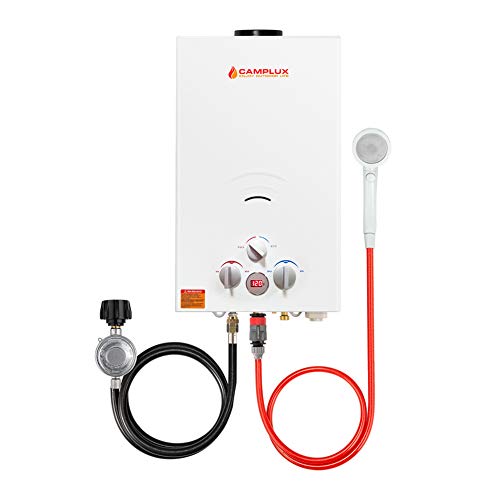
If you want the luxury of a hot shower in the Great Outdoors, Camplux offers a range of portable heaters. Their 10 liter 2.64 gallons per minute model is, by our reckoning, one of the best.
The ignition is powered by two D-cell batteries, and it hooks up to a propane cylinder. That makes it a great choice for off-grid locations. The ideal water pressure for best results is between 2.8 and 110 PSI.
The shower head is included in the package, alongside a gas regulator and all the necessary adapters.
It’s compact and lightweight enough to be positioned pretty much anywhere. Mount the heater on the side of a caravan to enjoy an outdoor shower. Horsey types could even position it on a stable door to treat Dobbin to a luxurious wash.
There’s a choice of eco or full modes, allowing you to save energy in warmer weather. And it comes with a range of safety features. There’s a flame failure device and automatic shut-off if temperatures exceed safe levels.
There’s also protection from freezing weather through the drain plug. This allows any residual water in the unit to be drained away, preventing damage from ice forming inside the system.
The maximum power output is 68,000 BTUs. That’s pretty impressive for a small unit. It’s efficient too. The stainless steel burner and tipping copper heat exchanger generate a thermal efficiency of 88.5 percent.
And although it’s primarily designed for outdoor use, it is possible to use it indoors too. Just make sure that there is good venting from a flue pipe or duct.
So is there anything here that’s less than ideal?
Well, the shower fitting won’t be to everyone’s liking. At five feet it’s long enough, but it’s not that robust. We’ve heard of issues with the rubber flaking and splitting.
And there is a limit to how long the heater will run for. Expect 20 minutes of operation before it shuts off. That should be enough, though, for a luxurious shower.
Pros:
- Excellent thermal efficiency
- Will work even without mains electricity
- Shower head, gas regulator and all adapters included in the package
Cons:
- The shower fitting isn’t as robust as we’d like
- 20 minute limit to runtime.
4. Eccotemp L10 2.6 GPM Portable Propane Tankless Water Heater (Our Top Pick)

Another portable water heater, Eccotemp’s offering has much in common with the Camplux model. It generates an almost identical water flow of 2.6 gallons per minute. And it’s compact enough to be taken along on camping trips.
Like the Camplux, this comes with its own shower head. This one, though, is a step up in terms of quality, made of chrome with a stainless steel hose. It also comes with a nine-foot gas regulator and hose to fit a standard twenty-pound grill-style propane tank.
It has a bit more power than the Camplux, generating an output of up to 74,500 BTUs. And it’s been field-tested at an altitude of 5,500 feet. So if you fancy taking a hot shower up a mountain, it’s a great choice.
This is another water heater with a time limit. It will cut off after 20 minutes of use. The timer resets as soon as the water is turned off.
There are a couple of other issues to be aware of.
The battery box isn’t well-positioned. If the heater is left outside in the rain, moisture will get in and rust the terminals. Sealing it up with some duct tape will deal with that problem.
And speaking of tape – the Teflon tape that’s supplied to cover the threads isn’t up to the job. Use your own for better results.
All in all, though, these are minor gripes for what is a very competitively priced portable water heater.
Pros:
- Capable of running effectively at altitude
- Comes with its own, good quality shower head, as well as gas regulator and hose
- Impressive output for a portable unit
Cons:
- The battery box will let in moisture unless you seal it with duct tape
- Replace the supplied Teflon tape with your own for better results sealing the threads.
5. Tengchang 10L 2.6 GPM LPG Gas Propane Tankless Water Heater

Tengchang’s hot water heater is a cost-effective option for lighter use applications.
Although it has the same 2.6 gallons per minute capacity as the Camplus and Eccotemp, this isn’t portable. It’s designed primarily for indoor installation, and will work well in locations like recreational vehicles or off-grid cabins. You’ll need a 4.3-inch flue duct for venting.
There’s no need for mains electricity, as the ignition is powered by two D-cell batteries. You’ll need to buy those separately.
This heater needs a minimum working water pressure of 3.6 bars. That’s a higher requirement than some other off-grid friendly models. And the external air temperature must be at least 17.6 degrees Fahrenheit for it to work effectively. The maximum air temperature is 113 degrees Fahrenheit.
These limitations are the main drawback of this compact water heater. If you want to use it in a location that meets these conditions, it will function well. And it offers very good value for money.
But it won’t cope with colder temperatures. If you’re somewhere that suffers from hard winters, look for another option. And if you’ve got a rural cabin with very low water pressure, other models will be more effective.
Energy efficiency with this unit is credible, coming in at over 80 percent. That fuel efficiency is supported by a choice of summer and winter settings. In summer, when the water flowing into the unit is warmer, it uses less power. Switch to winter use when it needs a boost to heat up colder water.
Pros:
- Cost-effective option for small homes, RVs and holiday cabins
- No need for mains electricity
- Summer and winter settings improve fuel efficiency
Cons:
- Quite fussy about air temperature requirements to work effectively
- Requires a minimum water pressure of 3.6 PSI.
6. Rinnai V75iP HE Propane Tankless Water Heater

The second Rinnai heater to make our list, the V Series occupies a considerably lower price point than the Ultima. If you’re looking for saving on an appliance from an established brand, the V75iP could be a good option.
So what do you get for your money?
Well, this is a high-efficiency water heater designed for indoor installation only. It will suit small to medium-sized homes, and its compact dimensions won’t require much space.
It will deliver a flow of hot water of up to 7.5 gallons per minute. But remember, those high flow rates require warm groundwater. If you live in an area with a colder climate, the flow will be much lower.
If you’re somewhere sunny – Hawaii, say – you’ll be able to get enough hot water for around five appliances at once. But head north to Canada, and that will reduce to two or three appliances.
The V75iP comes with its own app, so you can schedule heating times throughout the day. And you can even put it onto holiday mode remotely, saving money on your fuel while you’re away from home.
It comes with a good set of warranties for peace of mind. You’ll get a 10-year warranty on the heat exchanger, a year of coverage for labor costs, and five years on parts.
There are just a couple of things to be aware of with this one.
The first is the water temperature. It’s set to a maximum of 120 degrees. That’s perfect for a shower, as long as you don’t add cold water. But if you enjoy long soaks in the bath, it might not be the right choice.
The second issue is the noise. It’s not excessive, but the exhaust fan is louder than some other water heaters. If you want something very unobtrusive, it’s not the best option.
Pros:
- Plenty of power for small and medium-sized homes
- App allows hot water to be scheduled throughout the day
- Vacation setting can be selected remotely to save fuel while you’re away from home.
Cons:
- Maximum water temperature of 120 degrees Fahrenheit
- The exhaust fan is noisier than some other heaters.
7. VEVOR 16L Propane Tankless Water Heater (Best for the Money)

Vevor’s propane heater is one of the most economical on our list. But does saving money means compromising on performance?
Well, if looks are anything to go by the answer is certainly “no”. The stainless steel casing and LED display here are smart enough for any home.
It has separate dials to regulate the gas and water temperature, and a choice of winter or summer settings.
The latter improves fuel efficiency by directing less power to the unit in the warmer months. Vevor claims the unit offers an 11.5 percent energy saving, though it’s not clear what the comparator is.
It will cope with lower water pressure, requiring a minimum of 2.9 PSI to fire. And the water flow will stay steady at higher pressures too, up to 116 PSI.
It includes anti-freezing protection to avoid damage in cold weather. And there’s an automatic shut-off to prevent overheating. That kicks in if the water reaches a temperature of 167 degrees Fahrenheit. It shuts off after 20 minutes of use too.
So are there any downsides? Well, just a couple.
The first is the manual. It’s not what you’d call detailed. If you’re not experienced in installing water heaters, bring in a professional. It will add to your costs, but you’ll have a safe and effective appliance at the end of it.
The second issue is build quality. This isn’t an expensive water heater, and in places the cost-cutting shows. The copper tubing is soft, and the water outlet isn’t well designed. They’re issues that can be fixed, but you may have problems with leaking until they are.
But if you’re looking to save money and have the experience to make adaptations if necessary, this could be for you.
Pros:
- Cost-effective unit for smaller homes and RVs
- Can handle a big range in water pressure
- Choice of winter or summer settings for improved fuel efficiency
Cons:
- The lack of detail in the manual makes installation tricky
- The low-cost shows in some aspects of build quality.
Buying guide
So you’ve read through all the reviews, but you’re still not sure which is the best propane tankless water heater for you. Don’t despair! We’re going to take you through the different features to consider before you make your purchase.
How much hot water do you need?
Are you purchasing a water heater for a small cabin or recreational vehicle? Do you need something that will heat up just enough water for a shower while camping? Or are you looking for something that will stand up to domestic use in your home?
Remember that it’s not just showers that will use hot water. Household appliances like dishwashers, washing machines and sinks will need a supply too.
Count up the number of appliances you want to use at the same time. The higher the number, the higher the flow rate your water heater will need to support.
And remember that environmental conditions where you live will affect the flow rate too. Check your local groundwater temperature against the heater specifications to get an accurate idea of what you can expect.
If in doubt, choose something with more power than you think you’ll need. You don’t want to spend money on buying and installing a water heater that isn’t quite up to scratch.
What is the water pressure where you’ll be installing the heater?
Different water heaters require different levels of pressure to function effectively. If you’re in an area where water pressure is low, you’ll need a heater that will fire in those conditions. Low pressure is likely to be an issue on campsites, or in out-of-the-way rural locations.
Very high water pressure can present issues too, creating an uneven flow. So make sure you check the maximum, as well as the minimum, the heater can accommodate before you buy.
Will you install it yourself?
Installing a gas water heater isn’t a straightforward job. If you plan to tackle it yourself, make sure you check what comes in the package before you buy.
Some water heaters will come with all the regulators and adapters you need. Eccotemp’s i12LP even comes with its own venting kit.
But in other cases, you’ll need to buy components for installation separately. And it’s not always easy to know what to get. Vevor’s manual, for example, is silent on the question of the correct venting kit.
And on the subject of the manual – check reviews to see how clear it is. There’s a world of difference between installing a water heater with clearly illustrated guidance, and one that lacks detail.
And if you’re in any doubt about whether your DIY skills are up to installation, get a professional plumber in. You’re working with a gas appliance, and getting things wrong can be dangerous.
Ready to choose?
We hope you’ve now got a better idea of which propane tankless water heater will work for you. Think about the environment it will need to operate in, and then match it to the features you need. And make sure you’re realistic about the challenges of installation!
Our top pick for a portable water heater is Eccotemp’s L10. We love the power it packs into a small unit, and its ability to work effectively at altitude.
But if you’re looking for a heater to use at home, we’d recommend Rinnai’s V75iP. This will cope well with a range of water pressures. And the clever scheduling app and vacation modes are a real bonus.
So get ready to go shopping – and soon you’ll be enjoying limitless hot water on demand.
